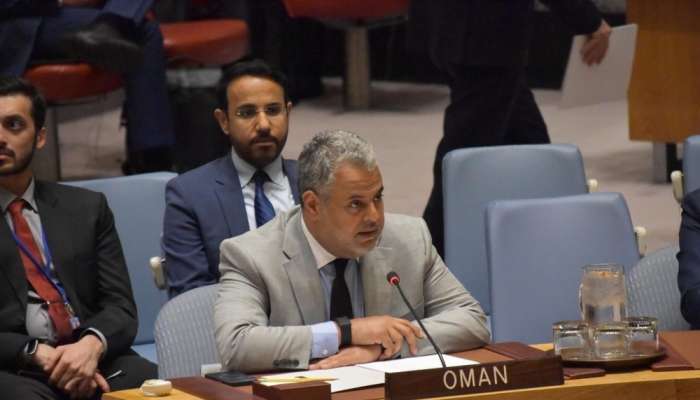
New York: The Sultanate of Oman has affirmed its decades-long active role in supporting the security and safety of regional and international maritime navigation, recognising the vital importance of these waterways to global trade and energy movement, as well as the legal, security, and humanitarian responsibilities they entail.
This came in a speech delivered by Ambassador Omar Said Al Kathiri, Oman’s Permanent Representative to the United Nations (UN), during the high-level session of the UN Security Council on “Enhancing Maritime Navigation Security through International Cooperation for Global Stability,” held in New York.
In his address, the Ambassador emphasized that Oman has worked to align its national legislation with relevant international legal frameworks, foremost the United Nations Convention on the Law of the Sea (UNCLOS), which is based on the principle of freedom of navigation, safeguards the responsibilities of coastal and transit states, and establishes the legal foundations for resolving maritime disputes.
He noted that Oman recently hosted the eighth Indian Ocean Conference, which focused on enhancing cooperation and integration in maritime security management, reflecting the importance of joint regional action.
He stressed that Oman firmly believes the security of seas and waterways is a fundamental pillar for maintaining regional and international stability, ensuring freedom of navigation, sustaining global trade, safeguarding food and energy security, and promoting sustainable development.
Oman’s Permanent Representative to the UN highlighted that escalating transnational threats—such as maritime terrorism, piracy, human and drug trafficking, organised crime, and illicit trade—alongside environmental repercussions from climate change and attacks on maritime infrastructure, necessitate well-considered collective responses that reflect the spirit of cooperation and shared responsibility enshrined in the UN Charter.
He also addressed Oman’s pivotal mediation role in reaching the ceasefire agreement announced on 6 May 2025, to ensure freedom of navigation in the Red Sea and the Bab el-Mandeb Strait. This constructive step demonstrates Oman’s commitment to easing regional tensions, enhancing maritime stability, and securing the smooth flow of international shipping.
He reiterated Oman’s emphasis on strengthening adherence to international law, particularly UNCLOS, as the comprehensive legal framework for all maritime activities, while stressing the full implementation of relevant Security Council resolutions and cooperation with the International Maritime Organisation (IMO) and other specialized bodies.
He pointed to the need for capacity-building in developing nations, particularly in maritime surveillance, information-sharing, emergency response, infrastructure protection, and combating organized crime through well-planned collective initiatives and effective partnerships.
Al Kathiri stated that modern technology is a crucial tool for enhancing maritime domain awareness and improving states’ ability to respond promptly to challenges, utilising satellites, data analysis, and artificial intelligence.
He underscored the importance of addressing the worsening impacts of climate change and environmental degradation, which compound maritime security risks, and called on the international community to develop integrated strategies for protecting the marine environment.
He also emphasised the value of constructive dialogue and preventive diplomacy in achieving collective security, resolving disputes, building trust among nations, and fostering a safe, stable environment for maritime, commercial, and economic activities.
Concluding his speech, the Ambassador affirmed that Oman—guided by its foreign policy principles of good neighbourliness, non-interference, and respect for international law—will remain a responsible partner in enhancing maritime navigation security, ensuring stability in international waterways, and supporting multilateral efforts to develop effective, comprehensive solutions to challenges facing seas and oceans. This commitment upholds international peace and security and serves the interests of all nations.